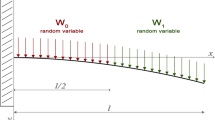Abstract
One goal of uncertainty characterization is to develop a probability distribution that is able to properly characterize uncertainties in observed data. Observed data may vary due to various sources of uncertainty, which include uncertainties in geometry and material properties, and measurement errors. Among them, measurement errors, which are categorized as systematic and random measurement errors, are often disregarded in the uncertainty characterization process, even though they may be responsible for much of the variability in the observed data. This paper proposes an uncertainty characterization method that considers measurement errors. The proposed method separately distinguishes each source of uncertainty by using a specific type of probability distribution for each source. Next, statistical parameters of each assumed probability distribution are estimated by adopting the maximum likelihood estimation. To demonstrate the proposed method, as a case study, the method was implemented to characterize the uncertainties in the observed deflection data from the tip of a cantilever beam. In this case study, the proposed method showed greater accuracy as the amount of available observed data increased. This study provides a general guideline for uncertainty characterization of observed data in the presence of measurement errors.







Similar content being viewed by others
References
Agarwal H, Renaud JE, Preston EL, Padmanabhan D (2004) Uncertainty quantification using evidence theory in multidisciplinary design optimization. Reliab Eng Syst Saf 85:281–294
Blei DM, Kucukelbir A, McAuliffe JD (2017) Variational inference: a review for statisticians. J Am Stat Assoc 112:859–877
Cho S-g et al (2016) Nonparametric approach for uncertainty-based multidisciplinary design optimization considering limited data. Struct Multidiscip Optim 54:1671–1688
Doucet A, Pitt M, Deligiannidis G, Kohn R (2015) Efficient implementation of Markov chain Monte Carlo when using an unbiased likelihood estimator. Biometrika 102:295–313
Easterling RG (2001) Measuring the predictive capability of computational methods: principles and methods, issues and illustrations SAND2001-0243, Sandia National Laboratories
Ferson S, Ginzburg LR (1996) Different methods are needed to propagate ignorance and variability. Reliab Eng Syst Saf 54:133–144
Ghanem RG, Doostan A, Red-Horse J (2008) A probabilistic construction of model validation. Comput Methods Appl Mech Eng 197:2585–2595
Guo J, Du X (2007) Sensitivity analysis with mixture of epistemic and aleatory uncertainties. AIAA J 45:2337–2349
Helton JC, Johnson JD, Sallaberry CJ, Storlie CB (2006) Survey of sampling-based methods for uncertainty and sensitivity analysis. Reliab Eng Syst Saf 91:1175–1209
Jung BC, Park J, Oh H, Kim J, Youn BD (2015) A framework of model validation and virtual product qualification with limited experimental data based on statistical inference. Struct Multidiscip Optim 51(3):573–583
Jung BC, Yoon H, Oh H, Lee G, Yoo M, Youn BD, Huh YC (2016) Hierarchical model calibration for designing piezoelectric energy harvester in the presence of variability in material properties and geometry. Struct Multidiscip Optim 53:161–173
Karniadakis GE, Glimm J (2006) Uncertainty quantification in simulation science. J Comput Phys 217:1–4. https://doi.org/10.1016/j.jcp.2006.06.009
Kim T, Lee G, Kim S, Youn BD (2018) Expectation-maximization method for data-based estimation of the cantilever beam end-to-end problem. In: 2018 AIAA Non-Deterministic Approaches Conference. p 1666
Lee G, Yi G, Youn BD (2018) Special issue: a comprehensive study on enhanced optimization-based model calibration using gradient information. Struct Multidiscip Optim 57(5):2005–2025
Liang B, Mahadevan S (2011) Error and uncertainty quantification and sensitivity analysis in mechanics computational models. Int J Uncertain Quantif 1(2):147–161. https://doi.org/10.1615/Int.J.UncertaintyQuantification.v1.i2.30
Lin G, Elizondo M, Lu S, Wan X (2014) Uncertainty quantification in dynamic simulations of large-scale power system models using the high-order probabilistic collocation method on sparse grids. Int J Uncertain Quantif 4(3):185–204
Ling Y, Mahadevan S (2013) Quantitative model validation techniques: new insights. Reliab Eng Syst Saf 111:217–231
Lopez I, Sarigul-Klijn N (2010) A review of uncertainty in flight vehicle structural damage monitoring, diagnosis and control: challenges and opportunities. Prog Aerosp Sci 46:247–273
McFarland J, Mahadevan S (2008) Error and variability characterization in structural dynamics modeling. Comput Methods Appl Mech Eng 197:2621–2631
McLachlan G, Krishnan T (2007) The EM algorithm and extensions, vol 382. Wiley, Hoboken
Raudenbush SW, Yang M-L, Yosef M (2000) Maximum likelihood for generalized linear models with nested random effects via high-order, multivariate Laplace approximation. J Comput Graph Stat 9:141–157
Romero VJ (2010) Data & model conditioning for multivariate systematic uncertainty in model calibration, validation, and extrapolation. In: 12th AIAA Non-Deterministic Approaches Conference, Orlando, FL, AIAA Paper. p 2010
Romero VJ, Weirs VG (2018) A class of simple and effective UQ methods for sparse replicate data applied to the cantilever beam end-to-end UQ problem. In: 2018 AIAA Non-Deterministic Approaches Conference. p 1665
Romero V, Schroeder B, Glickman M (2017) Cantilever beam end-to-end UQ test problem: handling experimental and simulation uncertainties in model calibration, model validation, and risk assessment, Sandia National Laboratories document SAND2017-4689 O, version BeamTestProblem32.docx
Soundappan P, Nikolaidis E, Haftka RT, Grandhi R, Canfield R (2004) Comparison of evidence theory and Bayesian theory for uncertainty modeling. Reliab Eng Syst Saf 85:295–311
Wilson BM, Smith BL (2013) Taylor-series and Monte-Carlo-method uncertainty estimation of the width of a probability distribution based on varying bias and random error. Meas Sci Technol 24:035301
Yao W, Chen X, Luo W, van Tooren M, Guo J (2011) Review of uncertainty-based multidisciplinary design optimization methods for aerospace vehicles. Prog Aerosp Sci 47:450–479
Zhang R, Mahadevan S (2000) Model uncertainty and Bayesian updating in reliability-based inspection. Struct Saf 22:145–160
Funding
This work was partially supported by the Technology Innovation Program (10048305, Launching Plug-in Digital Analysis Framework for Modular System Design) of the Ministry of Trade, Industry & Energy (MI, Korea). This work was also supported by a grant from the Institute of Advanced Machinery and Design at Seoul National University (SNU-IAMD).
Author information
Authors and Affiliations
Corresponding author
Additional information
Responsible Editor: Ren-Jye Yang
Publisher’s Note
Springer Nature remains neutral with regard to jurisdictional claims in published maps and institutional affiliations.
Taejin Kim and Guesuk Lee are co-first authors.
Rights and permissions
About this article
Cite this article
Kim, T., Lee, G. & Youn, B.D. Uncertainty characterization under measurement errors using maximum likelihood estimation: cantilever beam end-to-end UQ test problem. Struct Multidisc Optim 59, 323–333 (2019). https://doi.org/10.1007/s00158-018-2169-y
Received:
Revised:
Accepted:
Published:
Issue Date:
DOI: https://doi.org/10.1007/s00158-018-2169-y




